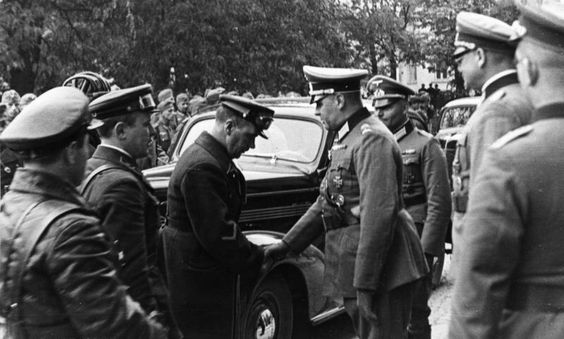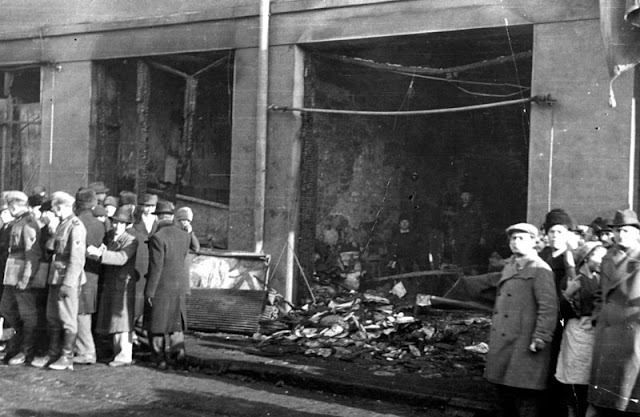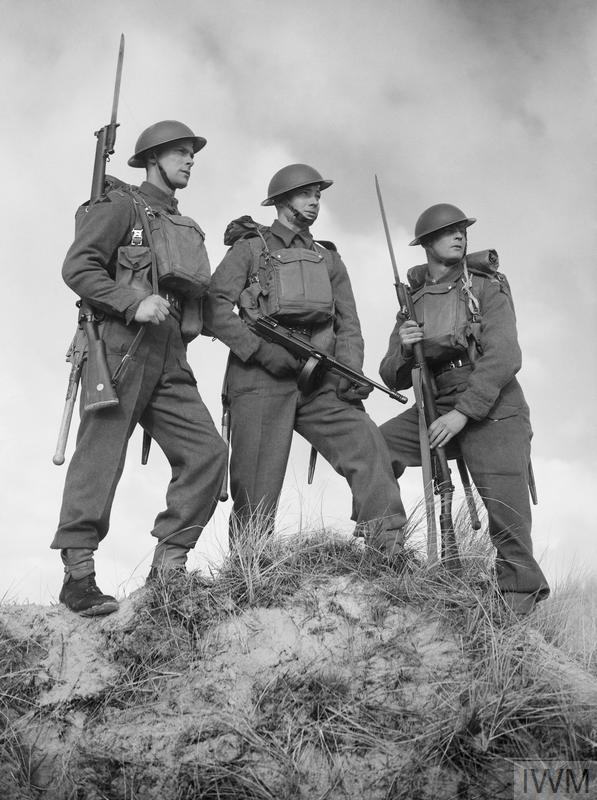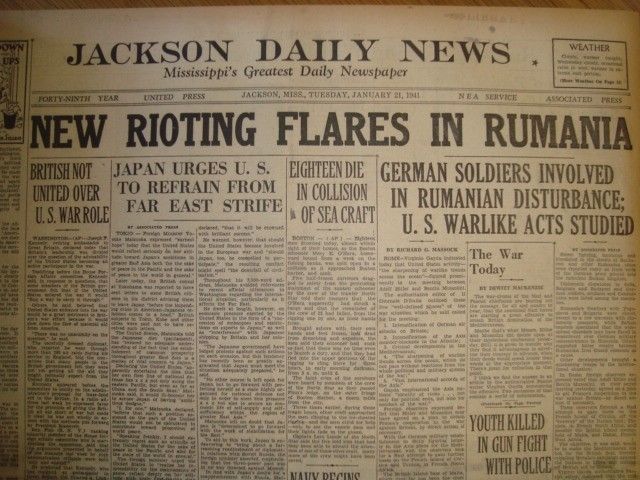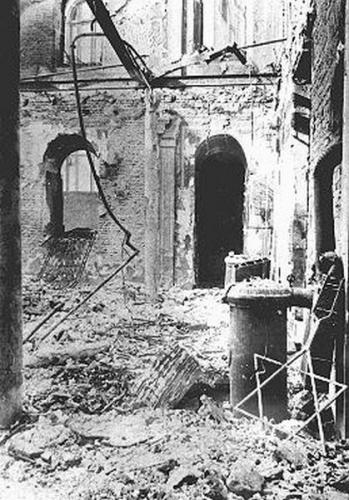Monday 20 January 1941
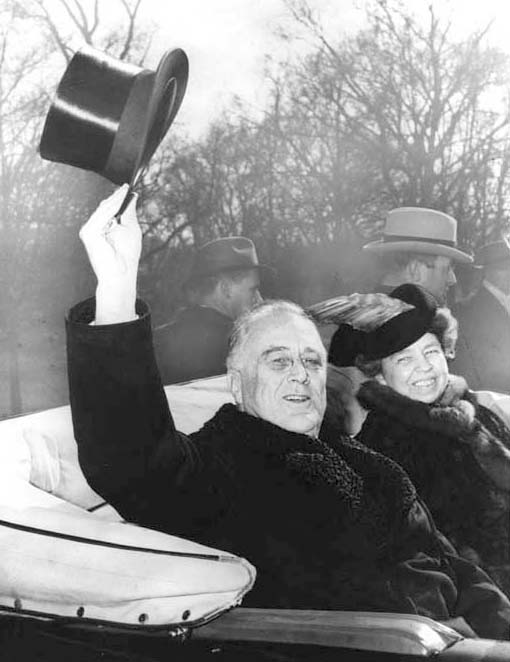 |
| Franklin and Eleanor Roosevelt as they return to the White House after FDR was inaugurated for a third term on January 20, 1941. Note how casual security is, with an open car and people milling about (likely Secret Service nearest the car). This is the first Inauguration held on January 20 pursuant to a law passed in 1933, previously they were held in March. (Roosevelt Library). |
Italian/Greek Campaign: The lines have stabilized on
20 January 1941 since the Greek capture of the Klisura Pass earlier in the month. The weather inhibits operations by either side in the mountains, but the Italians are planning a riposte to retake the critical pass. The Greeks now have access to the key Italian supply port of Valona, but the Italians are building up their troop strength in the region. There is some movement in the central section of the front, where the Greek II Corps takes possession of the Kala Heights.
The RAF bombers based near Athens attack Valona today. Italian bombers reciprocate with attacks on Athens and Pireaus, losing one bomber but sinking British 2878 ton freighter Vasco at Piraeus. There are one death and eight other casualties.
The question of British involvement in the land defense of Greece remains a matter of great concern, and not just to the parties directly involved. British Prime Minister Winston Churchill tells the War Cabinet that the Yugoslav regent, Prince Paul, has been in communication with the Greek government about this.
According to the War Cabinet Minutes of this date, Prince Paul has warned Greece privately:
that if they allowed any British land forces to enter Greece, the Yugoslav Government would allow the Germans to attack Greece through Yugoslavia.
This helps to explain Greek Prime Minister Metaxas' recent refusal to accept token British forces on the Greek mainland. This would give the Germans an open road through Yugoslavia to invade his country. The only hope that Greece has in the event of an invasion is to seal off the relatively short Bulgarian border. The long border with Yugoslavia would be virtually impossible to defend against a massive German invasion without the massive British troop presence that Metaxas has demanded, but not received.
East African Campaign: The RAF - including its Rhodesian and South African units - stage raids to support the ongoing offensive. One of the raids is on a power plant at Massawa, Eritrea, and there are other targets as well, such as Neghelli. Massawa is one of General William Platt's ultimate objectives on the coast.
The advance elements of Indian 4th and 5th Infantry Divisions continue advancing into Eritrea. Gideon Force, under the command of Orde Wingate, continues to escort deposed Abyssinian Emperor Haile Selassie into the country - when exactly he crosses the border appears to be uncertain, some sources say today, others around the time when the British began their offensive. There also is progress on the Kenyan front by the British, where they capture prisoners and supplies.
 |
| Baltimore News-Post, 20 January 1941 - "Roosevelt Takes Oath of Office." |
European Air Operations: Operations by both sides are light in northwestern Europe. The Luftwaffe drops a few bombs along the southern shore during the day, but nothing happens after dark.
Battle of the Atlantic: While German heavy cruiser Admiral Scheer has been on the loose in the South Atlantic since October 1940, it has not accomplished much. Today, it captures 5597-ton Dutch freighter Barneveld in the Atlantic 1200 miles off Freetown. There are no casualties. The Barneveld is carrying 5 American light bombers, 86 military vehicles and 1000 tons of ammunition. Admiral Scheer transfers the 100-man crew (which includes 51-52 Royal Navy personnel heading for assignments in the Middle East) to captured Norwegian tanker Sandefjord, then sinks the freighter with demolition charges.
Also today (some sources say the 21st), Admiral Scheer shells and sinks 5103-ton British transport Stanpark in the same vicinity off Freetown. Everybody aboard becomes a prisoner of war.
U-94 (Kptlt. Herbert Kuppisch), on her second patrol out of Lorient, torpedoes and sinks 3174-ton British freighter Florian about 140 southwest of the Faeroe Islands. The ship goes down by the stern in only 42 seconds at about 00:42. There are no survivors, all 44 onboard perish because it is extremely difficult to get out when a ship goes down that fast, especially at night when most are below in their bunks. Florian is an independent, and Kuppisch has chased it for 8 hours before getting into firing position.
Italian submarine Marcello, damaged in an earlier incident and on its way back to France, uses its deck gun to sink 1550-ton Belgian freighter Portugal far south of Iceland in the Southwest Approaches.
The Luftwaffe (Focke-Wulf Fw 200 Condors of KG 400 bombs 6516-ton Dutch freighter Heemskerk in the shipping lanes west of Ireland. The ship remains afloat through the night, but sinks on the 21st. There are eight deaths, the rest of the crew is picked up.
The Luftwaffe also bombs 5201-ton British freighter Tregarthen in the shipping lanes north of Londonderry, Ireland. The ship manages to make port at Oban.
Royal Navy minesweeping trawler HMT Relonzo hits a mine and sinks near Liverpool (Crosby Channel). There are 19 deaths, including the skipper, A.E. Slater RNR.
British 470 ton freighter Cornish Rose is caught in a severe gale off Swansea and loses its anchorage. Dragged toward shore, the crew abandons ship and is picked up by the Mumbles Lifeboat. It is a hazardous rescue, so two of the crew of the rescuer are awarded the Bronze Medal of the RNLI.
Convoy OB 276 departs from Liverpool, Convoy AS 12 departs from Alexandria, Convoy SL 63 departs from Freetown.
The Kriegsmarine orders 75 new U-boats, with numbers ranging from U-235 through U-852 (with gaps in the numbering).
Royal Navy anti-Submarine trawler HMS Sword Dance (Lt. Robert Dwyer) is commissioned.
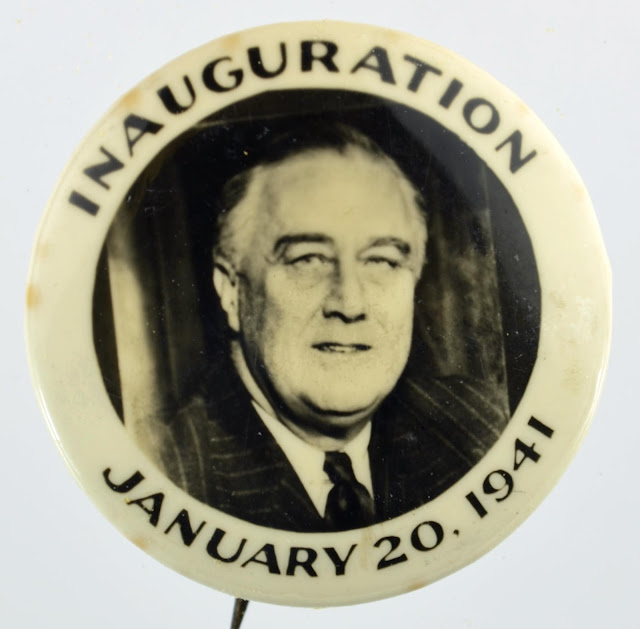 |
| Roosevelt Inauguration Day pin, 20 January 1941. |
Battle of the Mediterranean: The Luftwaffe makes scattered raids on Malta again, destroying four houses and severely wounding a civilian. Mass evacuations proceed in the Three Cities area - it is described as an "endless stream of refugees" which number roughly 9000 people. They are sent on buses to shelter in schools, churches, and basically any structure with a roof.
General O'Connor's Australian and British troops make their final preparations for the assault on Tobruk. The tactics will echo those of the assault on Bardia earlier in the month, with initial penetrations followed by engineer work that will provide a lane through which I tanks can penetrate and subdue the garrison. The RAF stages heavy air raids against Tobruk to soften it up for the attack, scoring hits on military barracks and other important areas of the camp. Monitor HMS Terror, gunboats HMS Gnat and Ladybird, and several destroyers bombard the Italian base during the night.
The Royal Navy creates a major operation to remove stricken aircraft carrier HMS Illustrious from Malta, where it is facing unceasing Luftwaffe attacks. Three separate forces are created, Forces A, B, and C. Force C is the most powerful and includes battleships HMS Barham and Warspite. The overall effort is Operation Inspection.
Royal Navy destroyer HMS Gallant, badly damaged by a mine recently (its bow was blown off) and under repair at Malta, is hit again by the Fliegerkorps X. The ship remains under repair, but the damage is extensive and the Admiralty no longer counts on its return. Gallant's guns are removed and placed on store ship Breconshire.
German/Italian Relations: Hitler and Mussolini conclude their two-day conference at Berchtesgaden. Mussolini apparently agrees to the stationing of limited numbers of German troops in Italy, which is a formality because Mussolini has been urgently requesting German assistance since November or December.
Hitler also
asks Mussolini to lean on Spanish leader Francisco Franco to enter the war and cooperate in the subjugation of Gibraltar, Operation Felix. While the closing of the Mediterranean at the Atlantic end is important, Hitler's real goal extends far beyond just capturing the British naval base and fortress. He wants to obtain U-boat bases on the Spanish Atlantic coast, which would be closer to the shipping lanes than those in France and also less vulnerable to RAF bombing attacks. Hitler indicates that the Wehrmacht would only need 20 days to prepare to take Gibraltar. This, however, is not something that the Wehrmacht feels is possible, at least during the winter months.
German/Arab Relations: The Grand Mufti of Jerusalem sends Hitler a letter requesting German assistance in driving the British out so they can retake the entire area of Palestine.
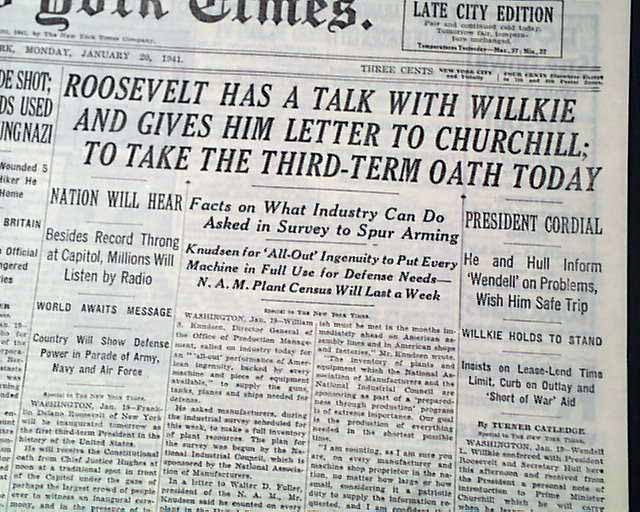 |
| The New York Times, 20 January 1941. The letter to Churchill takes precedence over the mundane issue of a third Roosevelt inauguration. |
Anglo/US Relations: President Roosevelt drafts a
letter by hand to be given to Winston Churchill by hand by Wendell Wilkie. It quotes from the Henry Wadsworth Longfellow poem "The Building of the Ship":
Sail on, Oh Ship of State!
Sail on, Oh Union strong and great.
Humanity with all its fears
With all the hope of future years
Is hanging breathless on thy fate.
Churchill, upon the letter's receipt, proclaims it "an inspiration." The letter is not famous in and of itself, but for the response that it provokes in Churchill in February which many believe has far-reaching implications.
Japanese Military: The Japanese ramp up their intelligence operations against the United States, increasing its budget to $500,000.
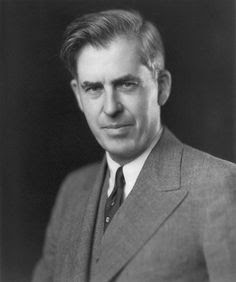 |
| Henry A. Wallace, sworn in today as the 33rd US Vice President. Wallace came within less than three months of becoming President during wartime. He missed immortality by that much. |
Romania: A Greek citizen in Bucharest kills a German officer. Why, along with the circumstances, is unclear. What is clear is that this sets off a major rebellion by the Iron Guard, who have been on edge recently following several days of "classes" about the Legionnaire Movement. Armed Legionnaires capture several key spots in Bucharest, including the Ministry of the Interior and various police stations. The Iron Guard also controls the media. When Antonescu tries to give a speech, the Legionnaires refuse to broadcast it.
The rebellion is fierce but short-lived. Iron Guard leader Horia Sima instructs his people in the Security Police and Bucharest Police to follow him instead of Antonescu, but he himself disappears. The Legionnaires induce/coerce peasants to go to Bucharest and mill about, but they are not trained soldiers and largely are unarmed. Antonescu is holed up in his palace, with only 15 loyal army officers. He does, however, maintain control over army units outside the vicinity and calls them to his rescue.
One of the telling features of this rebellion is that, while the media is under Iron Guard control, it engages in wildly anti-Semitic slurs and accusations. It broadly hints that Antonescu is just a puppet of Jewish interests (and Freemasons), and casts the blame on a supposed Jewish revolt (when the reverse is the case). Articles published during this period ended with the chilling line:
You know whom to shoot.
At day's end, the revolt remains in full swing.
Bulgaria: The Council of Ministers spends eight hours debating the current situation in the Balkans and trying to decide what to do about Hitler's pressure on them to join the Tripartite Agreement. The Soviet Union also has been interested in having them join the same agreement, though exactly who is joining what this point is in a state of absolute uncertainty. The ministers reluctantly conclude that Germany is just too strong to resist, and they basically reach a consensus to join the Tripartite Pact and become Germany's ally/satellite. However, they have no desire to commit troops in conjunction with any military adventures by the Wehrmacht.
Indochina: The Japanese offer to mediate in the ongoing frontier war between Thailand and the Vichy French government of Indochina.
China: While the Chinese Nationalists and Communists have been fighting each other recently, the Japanese have been fairly quiet. That changes today, with attacks by the Japanese 11th Army against the Chinese 5th War Area along the Huai River near Hsinyang. This is the start of the Battle of Southern Honan.
Holocaust:
Reichsfuhrer-SS Heinrich Himmler visits Dachau concentration camp. Accompanying him is Anton Adriaan Mussert, one of the founders of the National Socialist Movement in the Netherlands (NSB) and its formal leader. Himmler likes what he sees and is planning to expand the camp system due to the anticipated inflow of new inmates from the territories to be invaded pursuant to Operation Barbarossa.
 |
| Life Magazine, "U.S. Ski Trooper," 20 January 1941. Pictured is Sergeant Reese McKindley of the 15th Infantry; he is standing on Mount Rainier. This is the first of a series of covers showing US ski soldiers over the next few years. At this time, there are no US mountain troops - in fact, no permanent US ski troops - only experimental units at Mount Rainier. The founder of the National Ski Patrol, Charles Minot “Minnie” Dole, is advocating ski troops because of their proven utility in Europe. The National Park Service also is promoting the idea to provide a continuing justification for its funding and development of its mountain assets. Thus, this cover is the beginning of US ski troops. The initial US mountain division is formed in late 1941. |
British Homefront: Following a radio broadcast yesterday by Home Secretary Herbert Morrison, New Defence Regulations of the Ministry of Home Security come into effect approximately this date which mandate registration of all men and women between the ages of 16 and 60. Men are made responsible for fire-watching their own buildings Such service is not compulsory for women, "but let them volunteer and we shall applaud and welcome them."
This new fire-watching requirement is due to the successful Luftwaffe raid on London in late December which caused a firestorm due to incendiaries landing on roofs and being permitted by inaction to start fires. Morrison asked for volunteers, but an insufficient number stepped forward. Thus, a requirement was imposed on everyone. Everyone is required to perform 48 hours of fire-watching during blackout hours per month. Local Home Guard authorities are required to ascertain that all buildings, including abandoned or vacant ones, are watched.
Everyone depends upon each other because for mutual protection, because when buildings near each other burn, the fires can merge to create firestorms that rage out of control and devastate entire neighborhoods. This happened following the Luftwaffe raid of 29 December 1940. Incendiaries are seen as relatively easy to extinguish when they first drop, but once the fire catches hold, it often cannot be contained. Unofficial fire-watchers saved St. Paul's during the late-December Blitz attack, and the government views that example as a sign that entire cities can be protected through similar, mandatory measures.
Separately, Princess Marina, Duchess of Kent, makes a radio broadcast appeal for volunteers to the Women's Royal Naval Service (WRNS, the volunteers invariably being referred to as Wrens). Princess Marina is the honorary Commandant of the WRNS. Heretofore, Wrens have served as secretaries, drivers, clerks, ciphers, drivers and telephone operators. As a result of this broadcast, the Wrens are given additional jobs, including radio and air mechanics, maintenance, torpedo and boats' crews, radar detection finders, cinema operators, gunnery dome operators, submarine attack teacher operators, meteorologists, bomb range markers, vision testers, cine gun assessors, and anti-aircraft target operators.
American Homefront: President Roosevelt is sworn in for an unprecedented third term. Roosevelt is the only US President who has had or can have a third term due to a subsequent constitutional amendment barring more than two terms. During his inaugural address, Roosevelt states:
Democracy alone, of all forms of government, enlists the full force of men's enlightened will.... It is the most humane, the most advanced, and, in the end, the most unconquerable of all forms of human society. The democratic aspiration is no mere recent phase of human history.... We... would rather die on our feet than live on our knees.
Separately, syndicated columnist Walter Winchell
posts a column in which he writes:
The Story Tellers: The DAC News reports that a Harlemite watching Father Devine whisk by in a long limousine, niftied: “There, but for the grace of God—goes God.
As indicated, this quote was made by a "Harlemite" (presumably but not certainly African American) toward a certain obscure neighborhood religious figure, Father Divine (the column misspells his name, showing how obscure he is). The quote apparently (this is uncertain, it may be the other way around) is appropriated by others to refer to Orson Welles, who is at this time engaged in a vicious fight to get his film "Citizen Kane" finished and released. Many in Hollywood deeply resent Welles for any number of reasons, but primarily because he has been able to gain a contract from RKO which gives him exclusive control over the two films therein. This is an unprecedented degree of power by the "Boy Genius." In general, the quote "There but for the grace of God, goes God" is believed to have originated as a jibe at Welles, but this column is its first known appearance in any media and may be the true source of the phrase.
 |
| Crowds viewing the unprecedented third inauguration of Franklin Roosevelt at the Capitol in Washington, D.C., 20 January 1941. |
January 1941
January 1, 1941: Muselier ArrestedJanuary 2, 1941: Camp CategoriesJanuary 3, 1941: Liberty ShipsJanuary 4, 1941: Aussies Take BardiaJanuary 5, 1941: Amy Johnson PerishesJanuary 6, 1941: Four FreedomsJanuary 7, 1941: Pearl Harbor PlansJanuary 8, 1941: Billions For DefenseJanuary 9, 1941: LancastersJanuary 10, 1941: Malta Convoy DevastationJanuary 11, 1941: Murzuk RaidJanuary 12, 1941: Operation RhubarbJanuary 13, 1941: Plymouth BlitzedJanuary 14, 1941: V for VictoryJanuary 15, 1941: Haile Selassie ReturnsJanuary 16, 1941: Illustrious BlitzJanuary 17, 1941: Koh Chang BattleJanuary 18, 1941: Luftwaffe Pounds MaltaJanuary 19, 1941: East African Campaign BeginsJanuary 20, 1941: Roosevelt 3rd TermJanuary 21, 1941: Attack on TobrukJanuary 22, 1941: Tobruk FallsJanuary 23, 1941: Pogrom in BucharestJanuary 24, 1941: Tank Battle in LibyaJanuary 25, 1941: Panjiayu TragedyJanuary 26, 1941: Churchill Working HardJanuary 27, 1941: Grew's WarningJanuary 28, 1941: Ho Chi Minh ReturnsJanuary 29, 1941: US Military Parley With Great BritainJanuary 30, 1941: Derna TakenJanuary 31, 1941: LRDG Battered2020



